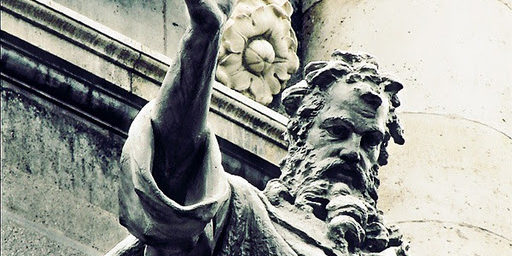
Irenaeus and Recapitulation
By Luke Stamps –
A couple of weeks ago I suggested that those who wish to read the classics of Christian theology should develop a personal “canon of theologians” and should try to work through their list during the coming year. Having completed my readings for January, I thought it would be helpful for me personally (and hopefully for Credo’s readers as well) to offer some reflections on my readings each month.
In January, I read selections from Against Heresies by Irenaeus of Lyons. This classic, second century polemic against various Gnostic heresies is important in the history of the church for many reasons. It gives us a glimpse into the Christological and Trinitarian thinking of the second century. It shows in seed form what would later become the doctrine of apostolic succession and the belief in the primacy of the Roman see. But one of the most significant aspects of Irenaeus’s theology articulated in Against Heresies is his doctrine of recapitulation: the notion that Jesus Christ recapitulated –summed up—all things in his work of redemption (see Ephesians 1:10). Recapitulation stresses Christ’s role as the Last Adam, the one who came to undo the curse brought upon humanity and the world by the first Adam’s sin. Consider this key passage from Against Heresies (V.21.1):
He has therefore, in His work of recapitulation, summed up all things, both waging war against our enemy, and crushing him who had at the beginning led us away captives in Adam, and trampled upon his head, as you can perceive in Genesis that God said to the serpent, “And I will put enmity between you and the woman, and between your seed and her seed; He shall be on the watch for your head, and you on the watch for His heel.” For from that time, He who should be born of a woman, [namely] from the Virgin, after the likeness of Adam, was preached as keeping watch for the head of the serpent. This is the seed of which the apostle says in the Epistle to the Galatians, “that the law of works was established until the seed should come to whom the promise was made.” This fact is exhibited in a still clearer light in the same Epistle, where he thus speaks: “But when the fullness of time had come, God sent forth His Son, made of a woman.” For indeed the enemy would not have been fairly vanquished, unless it had been a man [born] of a woman who conquered him. For it was by means of a woman that he got the advantage over man at first, setting himself up as man’s opponent. And therefore does the Lord profess Himself to be the Son of man, comprising in Himself that original man out of whom the woman was fashioned, in order that, as our species went down to death through a vanquished man, so we may ascend to life again through a victorious one; and as through a man death received the palm [of victory] against us, so again by a man we may receive the palm against death.
Note the emphasis on the fairness of Christ’s victory over Satan and the fittingness of his work as the human redeemer. Just as death and defeat came through the act of a man (Adam), so also life and victory come through the act of a man (Christ). One can hear Paul’s argument in Romans 5 echoing in Irenaeus’s logic: “For as by the one man’s disobedience the many were made sinners, so by the one man’s obedience the many will be made righteous” (Romans 5:19). Or we might think of Hebrews 5:14-18:
Since therefore the children share in flesh and blood, he himself likewise partook of the same things, that through death he might destroy the one who has the power of death, that is, the devil, and deliver all those who through fear of death were subject to lifelong slavery. For surely it is not angels that he helps, but he helps the offspring of Abraham. Therefore he had to be made like his brothers in every respect, so that he might become a merciful and faithful high priest in the service of God, to make propitiation for the sins of the people. For because he himself has suffered when tempted, he is able to help those who are being tempted.
We might even say that the Reformed emphasis on Christ’s active obedience finds deep historical roots in Irenaeus’s doctrine of Recapitulation. According to Reformed doctrine, Christ not only passively obeyed God through his atoning death; he also actively rendered obedience to God on behalf of sinners through his sinless, law-keeping life. In justification, Christ’s perfect human righteousness is, therefore, imputed to those to trust in him.
To be sure, Irenaeus didn’t articulate things in exactly this way, but a good case can be made that the Reformed doctrine resonates with his notion of Recapitulation in many ways. In any event, reading and meditating on passages like the one above can provide fresh opportunities for us to give thanks and praise to our Elder Brother who has given us the palm branch of victory over sin and death.
Luke Stamps is a Ph.D. candidate at The Southern Baptist Theological Seminary in systematic theology. Luke is a weekly contributor to the Credo blog and also blogs at Before All Things. Luke is married to Josie, and they have three children, Jack, Claire, and Henry. Luke is a member of Clifton Baptist Church in Louisville, KY.

